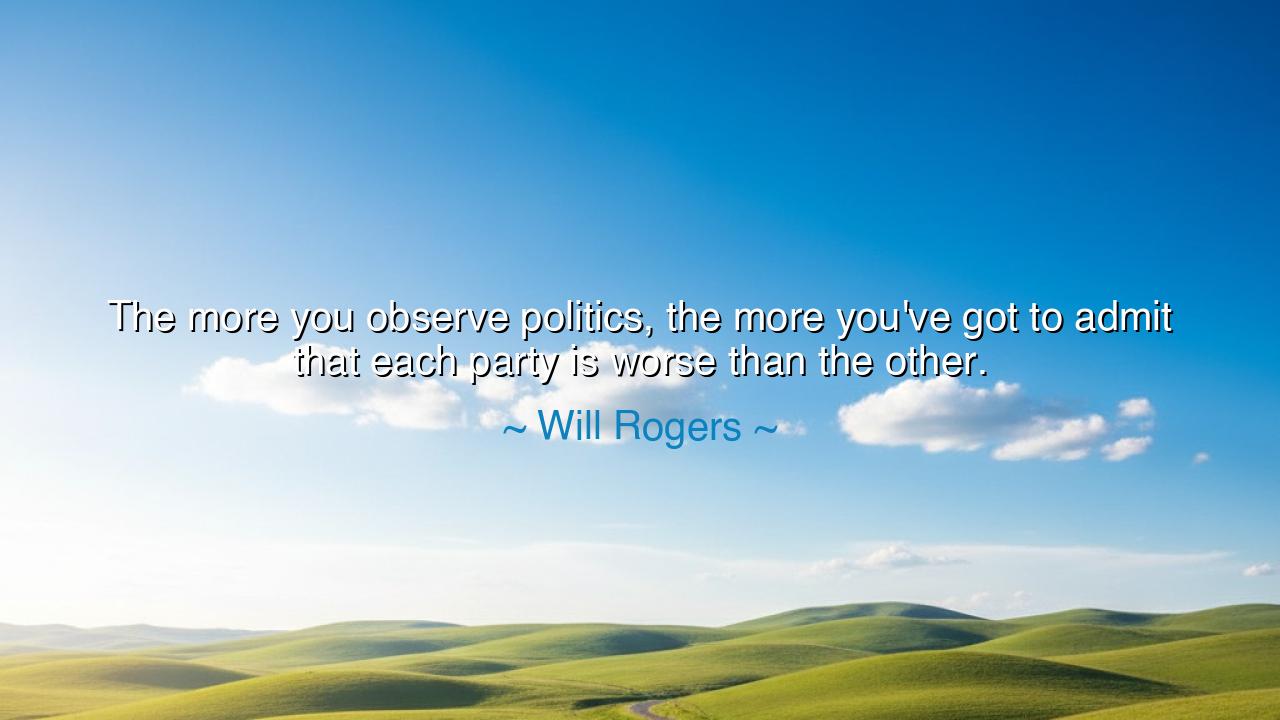
The more you observe politics, the more you've got to admit that
The more you observe politics, the more you've got to admit that each party is worse than the other.






Hear, O seekers of truth, the words of Will Rogers, a man who clothed wisdom in the garments of humor: “The more you observe politics, the more you’ve got to admit that each party is worse than the other.” Though spoken in jest, these words strike like a hammer against the stone of illusion. For Rogers saw with clear eyes the endless quarrel of factions, each claiming virtue, each denouncing the other, while the people were left to wonder if any truly served them. His laughter was sharp as a blade, revealing that parties are often mirrors of each other’s failings, bound by ambition rather than justice.
In this quote, Rogers does not mock politics itself, but the theater it becomes when loyalty to party overshadows loyalty to truth. Each side, in its pride, points to the faults of the other, magnifying them as proof of its own righteousness. Yet when the veil is lifted, one sees that both are stained by the same flaws—greed, corruption, forgetfulness of the people they claim to serve. Thus, as Rogers suggests, to observe closely is to see that the contest of parties is not the clash of good against evil, but often the struggle of lesser evils, each worse than the other in turn.
History confirms this grim wisdom. In the final days of the Roman Republic, two factions rose: the optimates and the populares. Each claimed to defend Rome, yet both descended into treachery, bribery, and violence. The Senate became an arena of personal gain, while the people suffered famine and civil war. Leaders like Pompey and Caesar claimed loyalty to Rome, but their loyalty was to their own power. Thus, Rome’s democracy was devoured from within, not by foreign enemies, but by parties who grew worse as they fought each other. Rogers’ words echo across time: when factions put themselves above the common good, all are diminished.
Nor is this confined to ancient days. In modern times, nations across the earth see citizens lose faith in their rulers, for promises are made in every election, yet broken in every term. In the United States, voters weary of Republicans and Democrats alike, each condemning the other while failing to lift the burdens of the poor, failing to curb corruption, failing to heal division. The people grow cynical, declaring as Rogers once did, that both parties are worse than each other. Such cynicism is dangerous, for it breeds apathy, and apathy is the grave where democracy is buried.
Yet Rogers’ laughter, though biting, was not meant to extinguish hope. Rather, it was a lamp held high, warning that blind faith in party is folly. His humor was a shield, teaching the people to see with clear eyes. For the lesson is not to despise all politics, but to remember that truth, justice, and the common good stand above the banners of any faction. Parties rise and fall, but principles endure. If the people demand integrity rather than allegiance, they can compel their rulers to serve more than themselves.
The teaching here is sharp: do not surrender your conscience to party loyalty. Observe, question, and hold leaders accountable, no matter their faction. When one party betrays justice, do not excuse it because it is “yours.” When another speaks truth, do not deny it because it is “theirs.” Truth has no party. Justice is not the property of factions. Wisdom requires that we rise above the quarrel of sides, lest we too become trapped in the endless cycle of “each worse than the other.”
Practical action flows from this wisdom. Become citizens, not mere partisans. Study the issues with your own eyes, not through the mouth of factions. Support leaders who serve principles, not parties. Demand honesty, transparency, and courage. And when both parties fail, as they often will, build new movements, forge new paths, and remind the rulers that power belongs to the people, not to the factions that claim to represent them.
Thus Will Rogers’ jest becomes a prophecy: “Each party is worse than the other.” Take this not as despair, but as a call to vigilance. For if the people awaken, if they refuse to be blinded by banners, then out of the ruins of party rivalry can rise a new politics—one not of factions, but of truth. Let this be the legacy you pass down: laughter sharpened into wisdom, wisdom kindled into action, action raised into justice.






AAdministratorAdministrator
Welcome, honored guests. Please leave a comment, we will respond soon